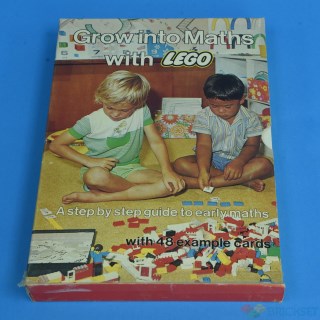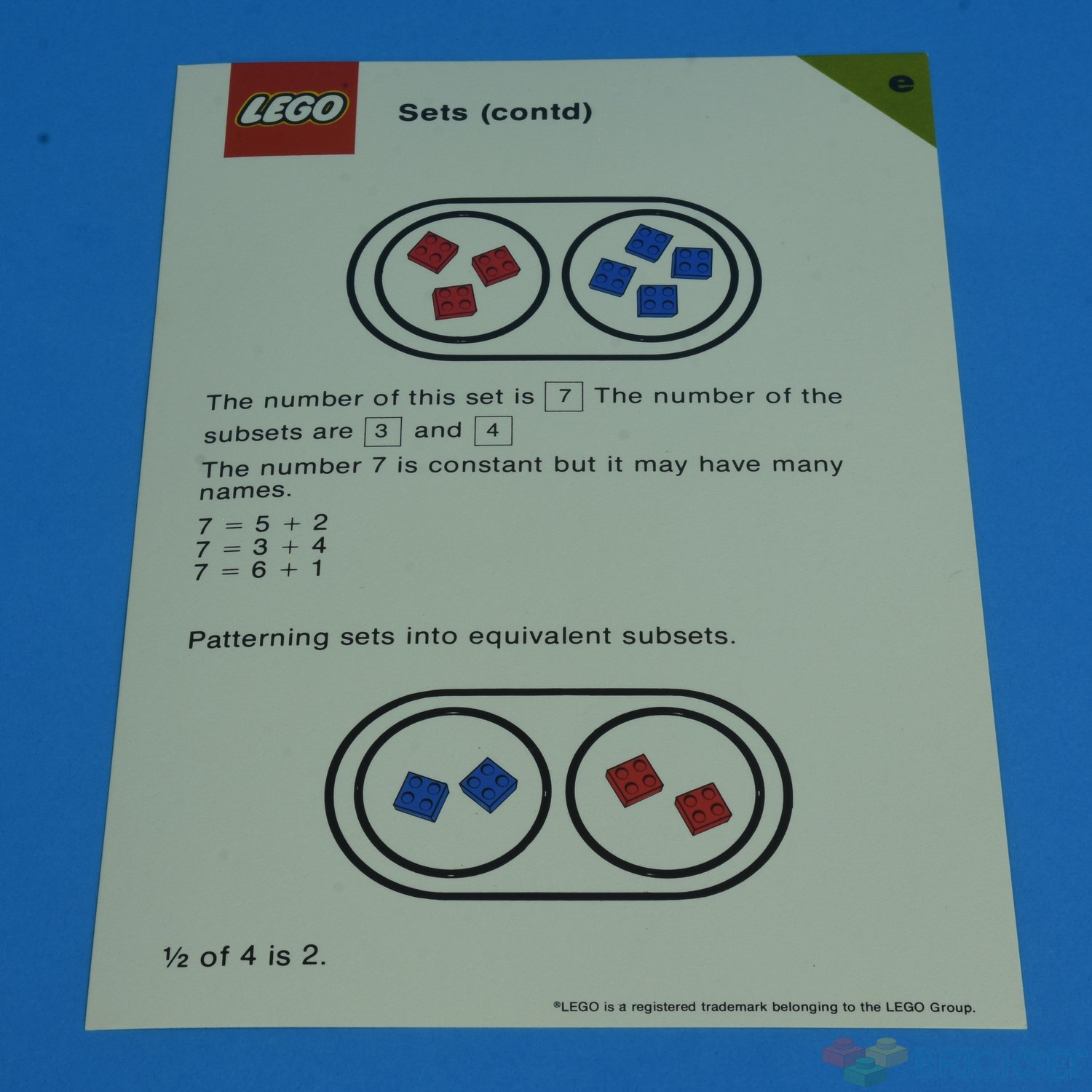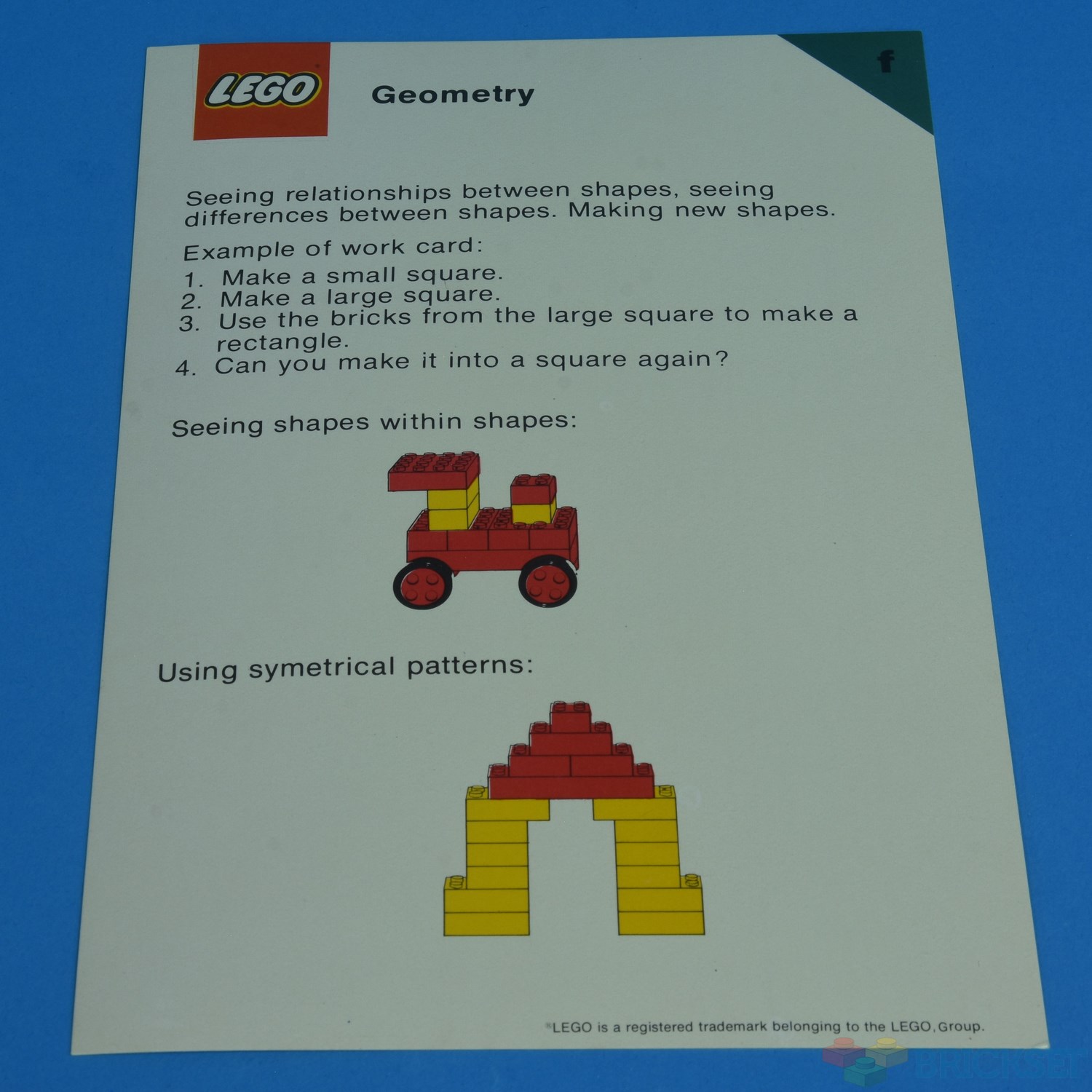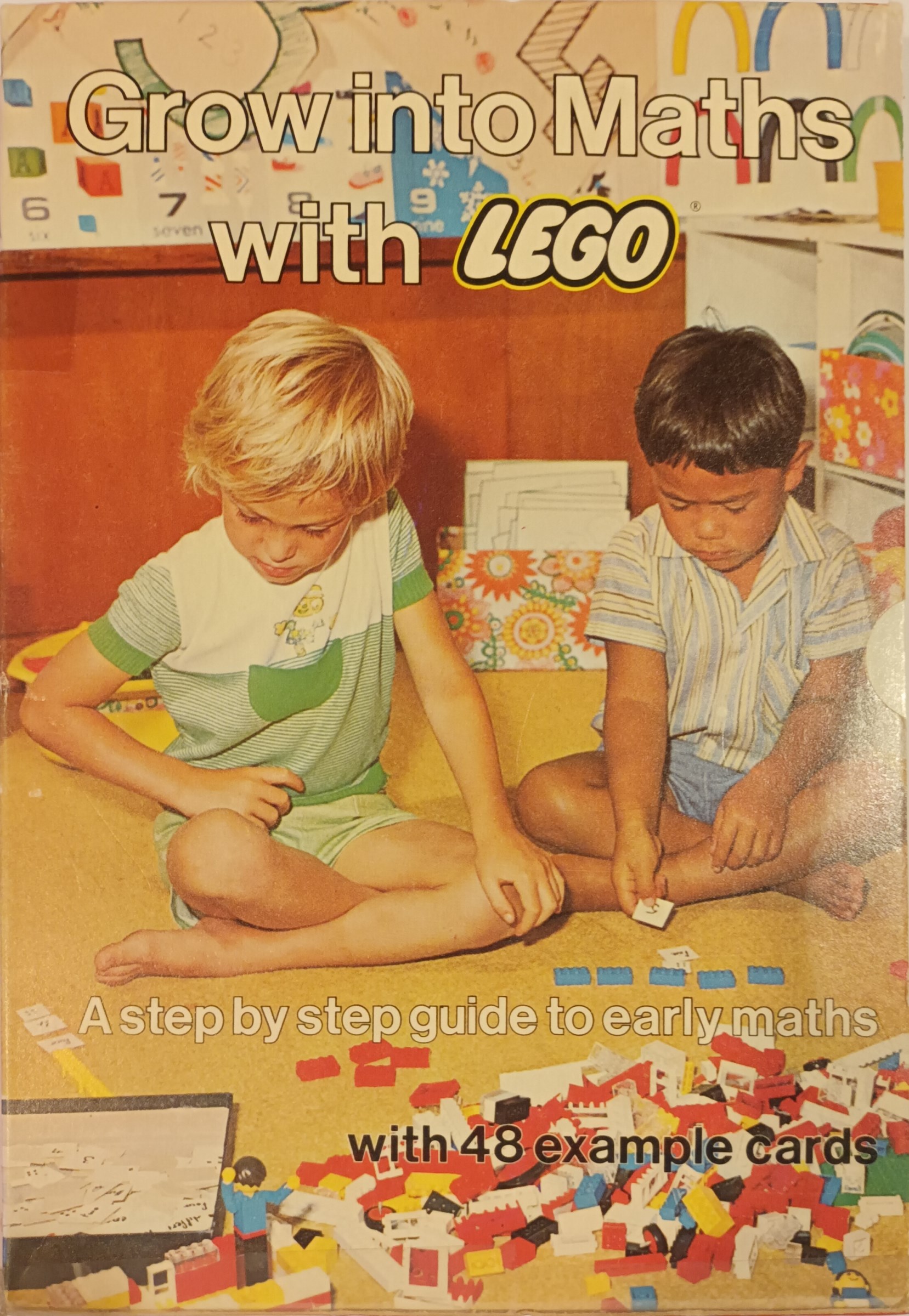Throwback Thursday - Grow into Maths with LEGO
Posted by FlagsNZ,
This week's Throwback Thursday article looks at a box of LEGO-branded mathematics activity cards - Grow into Maths with LEGO.
The activities contained on the cards are pitched to primary (or elementary) school aged children.
Read on as I showcase this interesting box of maths activity cards that is likely to be fifty years old.
The box
The Grow into Maths with LEGO box shows two children playing with a pile of LEGO bricks on a mat. There is a Homemaker figure within the pile.
The BrickLink entry indicates that these cards were authored by Dorothy McMillan and Annamae Barnett and that the box of cards was available in 1977.
Dorothy McMillan was a New Zealand children's author.
The back of the box indicates that these cards were published by Marlowe Agencies Ltd. It suggests that Marlowe Agencies were the New Zealand LEGO Distributors. This company was registered from December 1956 until October 1998.
There is also an example of one of the cards printed on the cover.
The cards
There are 48 cards in the box which are split into six groups of cards. Each group is identified by a letter contained in a small coloured triangle in the top right corner of the card.
- Group A (Pink) - 7 cards
- Group B (Red) - 7 cards
- Group C (Purple) - 9 cards
- Group D (Brown) - 9 cards
- Group E (Green) - 8 cards
- Group F (Dark Green) - 8 Cards
Each group has cards covering the following maths topics:
- Addition and Subtraction,
- Multiplication and Division,
- Fractions (Group F only),
- Geometry,
- Measurement,
- Numeration, and
- Sets
The tasks in each group get progressively more sophisticated as you advance through them.
The cards are A5 in size - 14.8 x 21.0 cm (5.8 x 8.3 inches).
Download
Download scans of the Grow into Maths with LEGO box of cards (15.2 Mb PDF)
Your feedback
The principal question that relates to the Grow into Maths with LEGO box of cards is whether these cards were available in other countries or were they available exclusively in New Zealand?
The team at The BLOCKS Collection appreciate and enjoy reading all your comments on the previous articles I have written and would welcome your help on this topic today.
If you are in Auckland, come and visit The BLOCKS Collection
The BLOCKS Collection is located in central Auckland, New Zealand.
Visiting The BLOCKS Collection is by appointment only. You can contact The BLOCKS Collection through Facebook and Instagram.
62 likes








20 comments on this article
Funny, I never knew this existed, but as a kid I also taught myself basic maths using LEGO.
This had the advantage that when I started school I already knew all the basics, something that can't be said for quite a few of my classmates. Guess they were more into Playmobil ;-)
Anyway, thanks for the very interesting article.
All fun and games until you have to show that all separable Banach spaces isometrically embeddable into C([0.1])
We had Cuisenaire rods. I've still got a set from when I was a kid.
Well I can certainly see why Cuisenaire rods were much more effective than Lego bricks for learning maths!
@Harmonious_Building said:
"All fun and games until you have to show that all separable Banach spaces isometrically embeddable into C([0.1])"
I wouldn’t call this a topic for primary school!
I agree with @AustinPowers. I never saw this set in my youth in Germany.
Ah, they extracted the best thing about any LEGO set into one fun educational activity: counting bricks. :'-)
Considering the amount of imaginary Lego I had as a kid, I bet they could have make me understand imaginary numbers without resorting to my TI-68....
I'm familiar with most of the small differences in US and British English grammar. But using the word maths with an 's' on the end is one example of British English that I was not aware of. We never use this spelling in US English. It sounds very bizarre to me.
I learned something new today! That happens a lot on this website, for some reason.
@woosterlegos said:
"I'm familiar with most of the small differences in US and British English grammar. But using the word maths with an 's' on the end is one example of British English that I was not aware of. We never use this spelling in US English. It sounds very bizarre to me.
I learned something new today! That happens a lot on this website, for some reason."
From: https://www.grammar.com/math_vs._maths
"Maths" is the abbreviation preferred by the British. In the UK, they say that "mathematics" ends in "s" and so should its short form. It's more likely that if you ask a British person, they would tell you they prefer "maths" as they have seen it spelled like this all the time.
When do we use "math"?
"Math" is preferred by the Americans, not only because they usually go for the shorter forms, but also because they consider "mathematics" is a mass noun that takes singular verbs and should, therefore, be abbreviated without the "s" in the end.
@woosterlegos said:
"I'm familiar with most of the small differences in US and British English grammar. But using the word maths with an 's' on the end is one example of British English that I was not aware of. We never use this spelling in US English. It sounds very bizarre to me.
I learned something new today! That happens a lot on this website, for some reason."
Americans calling it math sounds just as weird to us.
@woosterlegos said:
"I'm familiar with most of the small differences in US and British English grammar. But using the word maths with an 's' on the end is one example of British English that I was not aware of. We never use this spelling in US English. It sounds very bizarre to me."
Math sounds very bizarre to every British person, and I suspect every English-speaking person outside the USA.
@Huw said:
" @woosterlegos said:
"I'm familiar with most of the small differences in US and British English grammar. But using the word maths with an 's' on the end is one example of British English that I was not aware of. We never use this spelling in US English. It sounds very bizarre to me."
Math sounds very bizarre to every British person, and I suspect every English-speaking person outside the USA.
"
Agreed.
@Huw said:
" @woosterlegos said:
"I'm familiar with most of the small differences in US and British English grammar. But using the word maths with an 's' on the end is one example of British English that I was not aware of. We never use this spelling in US English. It sounds very bizarre to me."
Math sounds very bizarre to every British person, and I suspect every English-speaking person outside the USA."
English is not my native language, and wouldn't say any of the two sounds bizarre to me, but the American version sounds much more familiar to me. I guess Rammstein was right, we are all living in Amerika.....
@woosterlegos said:
"I'm familiar with most of the small differences in US and British English grammar. But using the word maths with an 's' on the end is one example of British English that I was not aware of. We never use this spelling in US English. It sounds very bizarre to me.
I learned something new today! That happens a lot on this website, for some reason."
It doesn't usually happen to me (as I'm a huge Anglophile), but I did encounter a new one in this review: https://brickset.com/article/95668/review-42157-john-deere-948l-ii-skidder
@FlagsNZ said:
" @Huw said:
" @woosterlegos said:
"I'm familiar with most of the small differences in US and British English grammar. But using the word maths with an 's' on the end is one example of British English that I was not aware of. We never use this spelling in US English. It sounds very bizarre to me."
Math sounds very bizarre to every British person, and I suspect every English-speaking person outside the USA.
"
Agreed."
Eh... we'll agree to most/all British spellings (at least formally--actual practice in the wild is a hodgepodge, especially since the introduction of spellcheck has eroded all sorts of native habits), but Canadians would abbreviated mathematics as math too.
@Formendacil said:
" @FlagsNZ said:
" @Huw said:
" @woosterlegos said:
"I'm familiar with most of the small differences in US and British English grammar. But using the word maths with an 's' on the end is one example of British English that I was not aware of. We never use this spelling in US English. It sounds very bizarre to me."
Math sounds very bizarre to every British person, and I suspect every English-speaking person outside the USA.
"
Agreed."
Eh... we'll agree to most/all British spellings (at least formally--actual practice in the wild is a hodgepodge, especially since the introduction of spellcheck has eroded all sorts of native habits), but Canadians would abbreviated mathematics as math too."
Right... Canadians can't make up their mind whether they use American English or British English, so tend to do a bit of both :-)
Why does everything have to descend into a commentary on spelling? This is a regular occurrence - multiple posts about differences in spellings and/or etymology. This is supposed to be about LEGO is it not?
You would risk sanctions if you kept so off-topic on the server :-o
Curious to know how you would do fractions with Lego bricks? Nowadays you could do quarter or have of a circle plate, but those pieces did not exist then?
@Belboz said:"Why does everything have to descend into a commentary on spelling? This is a regular occurrence - multiple posts about differences in spellings and/or etymology. This is supposed to be about LEGO is it not?
You would risk sanctions if you kept so off-topic on the server :-o"
If you don't like it, then just block the offending users. Oh, wait, you'd have to block staff members! Seriously, since @Huw has made more than one such post, both here and in other comment threads, I don't think sanctions are going to be happening because of that. Besides, this article is about a tool for teaching math, so why not teach language, too?
@ambr said:
"Curious to know how you would do fractions with Lego bricks? Nowadays you could do quarter or have of a circle plate, but those pieces did not exist then? "
You could do fractions with the pieces that existed then, but only once.
Math may be a universal language, but that doesn't mean I speak it. (I've never had a head for numbers... unless it's Lego-related numbers!)